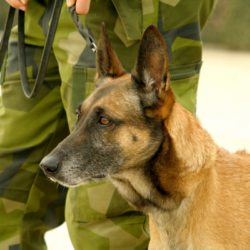Allergies in pets, whether dogs, cats or horses, are common conditions that can significantly affect their well-being. These allergic reactions, often triggered by environmental, food or parasite allergens, mainly manifest themselves as itching, skin lesions and digestive problems. While conventional veterinary medicine offers a range of medicinal treatments, more and more owners are looking for alternative, more natural solutions that respect their pets’ biological balance.
Using medicinal plants
Medicinal plants can help soothe allergic symptoms. Nettle, for example, can be used to reduce itching and inflammation.
Plants, essential oils and herbs play a role in animal health. This holistic method treats allergies in dogs, cats and horses. For thousands of years, these natural remedies have been used to relieve allergic symptoms. They serve as an alternative or complement to conventional treatments.
Balms with essential oils are prized for their antiseptic, soothing and regenerating effects. Essential oils such as lavender, chamomile or tea tree are often chosen. It is important to dilute them in vegetable oils such as sweet almond or coconut oil. Prepared in this way, they can soothe itching and help repair the skin. These oils also have the advantage of moisturising and nourishing the epidermis, strengthening the skin barrier against allergens.
Balancing your diet
Diet balancing is an integral approach to the treatment and prevention of allergies in animals. The foundation of this approach lies in an in-depth understanding of animal nutrition and its interaction with the immune system.
A well-balanced diet with the right nutrients plays a crucial role in maintaining the animal’s overall health. Proteins, fats, carbohydrates, vitamins and minerals need to be provided in adequate quantities and appropriate proportions. Proteins are often the cause of food allergies in animals. Selecting hypoallergenic and easily digestible protein sources can reduce the animal’s sensitivity to certain allergies.
A good balance of fibre in the diet helps to maintain healthy digestion, which is essential for optimal absorption of nutrients and boosting the immune system. Vitamins and minerals play a key role in immune function. A deficiency in certain micronutrients can weaken the immune system and make the animal more vulnerable to allergies.
Identifying and eliminating potential food allergens is crucial. This may require specific allergy tests to determine individual sensitivities. In some cases, the use of specific nutritional supplements, such as omega-3 fatty acids, can help modulate the immune response and reduce the inflammation associated with allergies.
The role of probiotics
Probiotics are beneficial live micro-organisms that play an important role in the prevention and management of allergies in dogs, cats and horses by helping to balance the intestinal microflora. This is crucial because an imbalance in this microflora, known as dysbiosis, can affect the immune system and increase susceptibility to allergic reactions.
Intestinal health is intrinsically linked to immune function. Probiotics help to balance the intestinal flora, inhibiting the growth of pathogenic micro-organisms and promoting digestive health. Probiotics can strengthen the intestinal barrier, preventing allergens from entering the bloodstream.
Probiotics can modulate the immune response. They can reduce systemic inflammation by inhibiting the release of inflammatory cytokines, which are often involved in allergic reactions. They can also stimulate innate immunity, increasing the body’s resistance to environmental allergens.
Although the use of probiotics in the management of allergies in pets and horses is promising, it is important to note that not all probiotics are created equal. The specific strain, dose and duration of treatment can affect the effectiveness of the probiotic. It is therefore advisable to consult a vet for personalised advice on the choice and use of probiotics for animals suffering from allergies.
Practical advice for allergy prevention
Allergy prevention starts with taking simple but effective preventive measures. Here are a few practical tips:
- Maintaining good hygiene: Keeping your pet clean and well-groomed can reduce the amount of allergens present on its skin and coat. Using hypoallergenic shampoos and brushing regularly can help.
- Avoiding known allergens: When a pet has specific allergies, it is imperative to avoid exposure to these allergens. This can include eliminating certain foods or using non-irritating household products.
- Parasite control: Parasites such as fleas can trigger allergies. Regular monitoring and the use of appropriate anti-parasite treatments can prevent these reactions.
- General health monitoring: Regular monitoring of the animal’s health allows early detection of signs of allergies, facilitating early and effective intervention.
- Importance of the environment : The pet’s living environment plays a crucial role in allergy prevention. Here’s how:
- Regular cleaning: Keeping the environment clean by removing dust, dust mites and other potential allergens can significantly reduce the risk of allergies.
- Choice of bedding and household products: Using hypoallergenic materials for bedding and household products without harsh chemicals can minimise exposure to allergens.
- Air quality: Regular maintenance of ventilation systems and the use of air purifiers can improve indoor air quality, thereby reducing airborne allergens.
- Plants and gardens: Certain types of plant can be allergenic to animals. Careful selection and placement of plants can help prevent these allergies.





